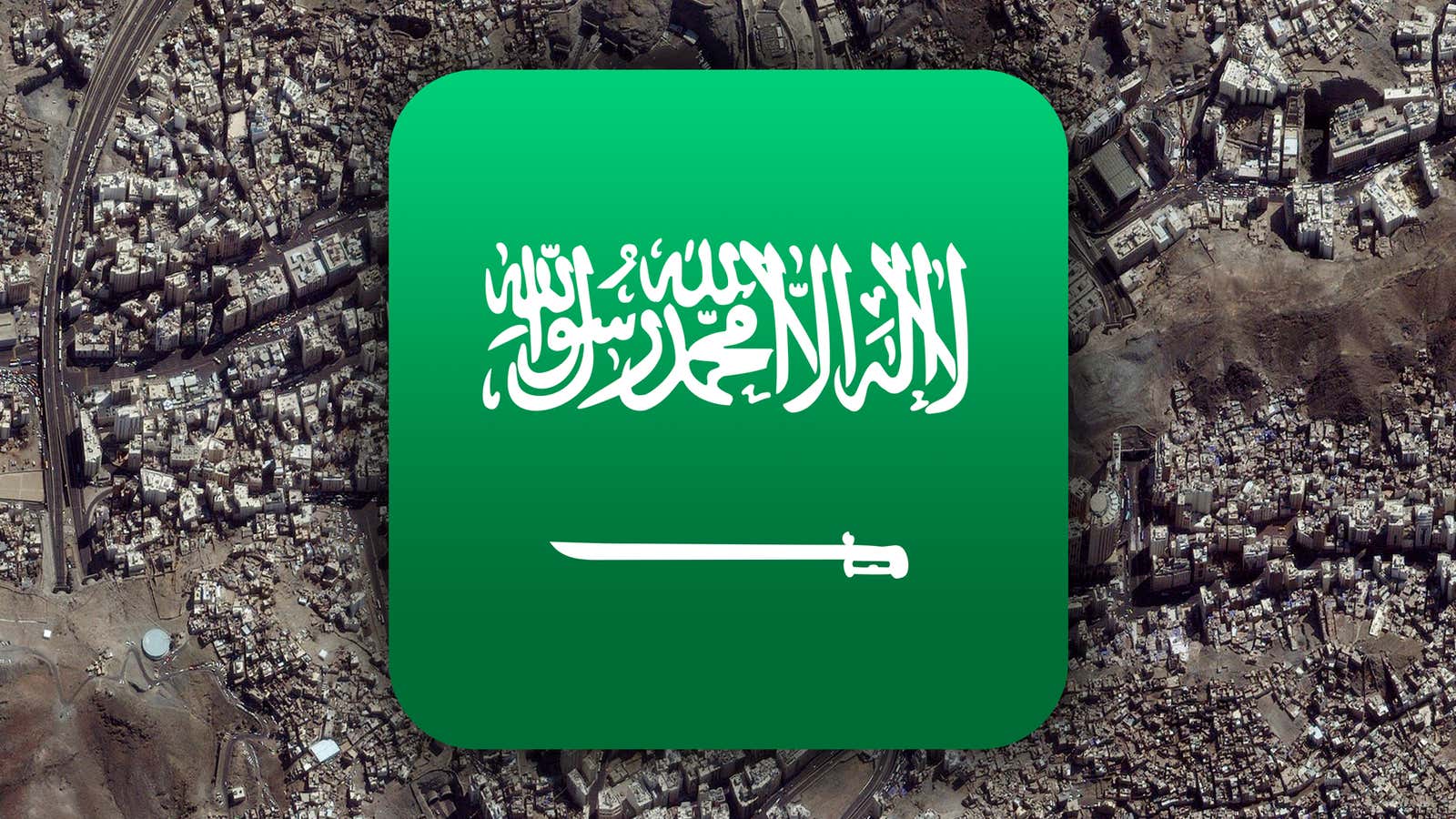On March 15, 2002, 15 Saudi girls burned to death inside their school in Mecca. They were not trapped by fallen debris, or unaccounted for by firefighters. The mutaween, Saudi Arabia’s religious police, would not allow the girls to leave their burning school because they were not covering their hair or wearing their abayas.
The mutaween’s job is to root out violations of Saudi Arabia’s strict interpretation of Islam. As such, their ranks attract fanatics who live to tell others what to do, even when those others are schoolgirls trapped in a burning building.
Fourteen years after 15 children were needlessly incinerated, the mutaween have had their wings clipped just a tad. They can still harass women, unmarried couples, LGBT people and anyone else who violates the social tenets of Wahhabism, or simply look like they’re ripe for abuse or extortion. But they can no longer detain people, nor can they interfere with firefighters.
The most powerful absolute monarchy on earth is signaling that they’re going to make a few changes.
Deputy Crown Prince Mohammad bin Salman al-Saud—he’s also second deputy prime minister and minister of defense—has a plan to modernize the modern Saudi state, the most powerful absolute monarchy on Earth. The 30-year-old is the son of King Salman, who will be the final son of Ibn Saud, the kingdom’s founder, to rule. It is heavily rumored that the king, crowned last year, suffers from dementia, and was in fact hospitalized for it in 2015. Even if King Salman is not ravaged by the disease, it is generally agreed that his son is the power behind the throne. The millennial monarch has superseded his older cousin, Crown Prince Muhammad bin Nayef, in visits to Washington and other public appearances that are usually the domain of the elder’s office when al-Saud faces an aged king.
As his grandfather created the modern kingdom, Mohammad bin Salman believes he can create the next one.
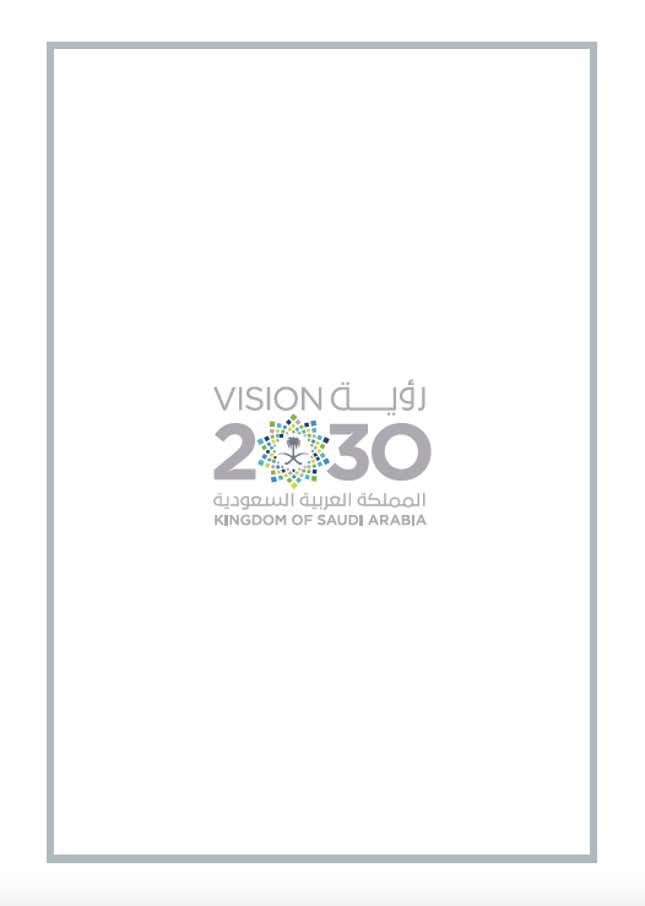
His ambition is spelled out in Vision 2030, a development proposal written by an American consulting agency that seeks to boost non-petroleum revenue, increase government efficiency and transparency, and develop the Saudi workforce. For a nation whose GDP is 48 percent petroleum-related, whose government collects 80 percent of its revenue from petroleum, and whose workforce is 52 percent migrant workers, this is a tall order to pull off in 14 years.
Vision 2030 was, like so many flashy Gulf PR pushes, completely untethered to the world in which it was created. This roadmap to a shiny new technocratic kingdom was laid out just three months after 47 people, including the beloved Shia cleric Nimr al-Nimr, were executed in an afternoon on opaque charges of “terrorism.”
Nimr’s foremost crime was dreaming of a better world. In a state where clerics regularly declare photographs Satanic or issue fatwas against the game of chess, Nimr preached against sectarianism. He spoke out against the government of Syria as strongly as he did al-Saud. But he was an infidel—the brutal irredentism of Wahhabism doesn’t see Shias as fellow Muslims; it barely sees them as fellow human beings—and spoke against the Saudi ruling family. That was enough to cost him his life. It remains unknown what the 46 others killed on the same day did, if anything. Nimr’s body has not been returned to his family, and currently rests in an unmarked grave (Wahhabism forbids ornate headstones because it’s seen as idolatry).
One year before Prince Salman’s show and tell presentation, Saudi Arabia began its ongoing involvement in Yemen’s civil war. The nominal “peacekeeping operation” has more resembled a crime against humanity, as the Saudi-led coalition drops bombs on hospitals, schools, and anywhere where civilians are tightly clustered and primed to be vaporized.
In October of this year, just six months after the prince’s PowerPoint, Saudi jets hit a rare triple-tap air strike in Sanaa, reducing a funeral to a “lake of blood.” They hit an initial target; then the people who tried to help the maimed; and then the funeral for everyone who died in the first two bombings. The Saudis know this is a war crime.
Presenting an absurdly unrealistic modernization plan for your country while your family violently represses its subjects and your military incinerates foreigners might, for some nations, seem an embarrassing contradiction, but Prince Salman knows he has a few advantages: First, that none of Saudi Arabia’s western allies will ever do anything more than issue a press release alluding to “deep concerns” for his nation’s human rights record. Second, that there’s money to be made in any attempted Saudi reshaping, no matter how obviously ill-conceived.
Here are some of the statistics that make Silicon Valley plutocrats drool when pondering business opportunities in the kingdom: Fifty percent of the population of Saudi Arabia is under 25. 51 percent of Saudi Arabian college students are women. For professional lanyard-wearers, the most exciting aspect is probably Saudi Arabia’s prodigious adaptation of tech. According to The Economist, the kingdom has the world’s highest rate of penetration for Twitter.
The numbers paint an attractive picture for a particular breed of budding technocrat or venture capitalist. Just ask Balaji Srinivasan, CEO of cryptocurrency company 21 Inc and board partner at Andreessen Horowitz, who had this to say about Saudi Arabia’s recent investment in Uber:
For people like Srinivasan, a vindicating narrative is playing out. A young population craving freedom flocks to new technology, bypassing their oppressive gatekeepers, ultimately to ring in modernity—all while investors enjoy a windfall from a new generation of app users. The invisible hand rightfully triumphs over the iron fist, as it was always meant to be.
This fairy tale allows people who make ungodly sums of money for contributing very little of actual value to society to see their compensation as a just—even modest—reward for changing the world. Like most things rich people tell themselves after the sun goes down, it’s self-serving bullshit.
The structural forces oppressing the most marginalized Saudis in the streets and prisons, it turns out, do not wither in the presence of a 4G data connection. The most popular Saudi accounts on Twitter aren’t bold young entrepreneurs challenging the social order; they’re hardline preachers who tell those young people that they should be put to death if they lay with someone of the same sex. The people who want to punish sinners don’t end their pursuit of heresy once they log on. In fact, Saudi Arabia shows how easily the tools tech entrepreneurs imagine will liberate the world can be bent to the service of oppression of the vulnerable.
LGBT, atheist, and otherwise dissenting voices on social networks in places like Saudi Arabia are incredibly vulnerable to the doxxing of personal information. It’s such a popular activity among the truly devout and sociopathic that there’s now an app that lets you report atheists directly to Saudi cops. Doxxing is unpleasant anywhere, but Saudi Arabia is one of the few places where it can easily get you imprisoned, or worse.
Despite the grave consequences for users, Twitter’s support team is unable to take action. Most of the time when a Saudi user’s personal information is shared on Twitter, the doxxer in question isn’t suspended. If they are, it’s many days after the information has been disseminated, and the punishments for the person unfortunate enough to have been doxxed have likely been dealt out. When I spoke to someone familiar with Twitter’s corporate structure, they told me that the company simply doesn’t have enough Arabic speakers on its support team to police doxxing in Saudi Arabia.
(Twitter did, it should be noted, have sufficient skill in Arabic to cash a $300 million check from Prince al-Waleed bin Talal.)
I’ve known about Saudi doxxing for years, but the severity of the problem was made clear earlier this year, when a Twitter user known as @old_gaes incited his followers to report a 16-year-old Kuwaiti atheist’s identity to her family. (The story was detailed by the Daily Beast’s Ben Collins here.)
I, along with others, implored people to report him, but his account and the threats he made to this child’s safety remained up, until one intrepid user found his insults against the Dubai police and threatened to report him in kind, causing him to deactivate. Ratting is a double edged sword.
He is, of the time of this writing, suspended. But given how quickly Twitter will respond to blue-checkmarked power users crying harassment, it was painful to see the company completely ignore scores of reports they were getting warning of the very real possibility that a child’s life had been endangered.
One strain of Western thought ignores the brutality of the Saudi regime. It’s an ugly ally to have, we reason, but this is just how they do things there. All the beheadings in Riyadh, war crimes in Sanaa, and millions of dollars that seem to end up in terrorist hands are the cost of doing business with our friend and vital counterweight to Iran. Another strain declares that this is their rotten culture. We must break our links with this part of the world because their natural disposition is barbarism, and their citizens are fat off our petrodollar, laughing at us as they spend it on terror networks.
As one learns about the lives of atheist and LGBT youths in Gulf states who face rampant threats on social media, it becomes clear that the truth is less comfortable than complacency or righteous rage. The most vulnerable people inside the kingdom are quite real. They will tell you the nation they live in is insane and that they fear for their lives. For various convenient reasons, be they racialized terror or misplaced cultural relativism, Americans sometimes don’t quite see Saudi Arabia for what it is: a totalitarian state.
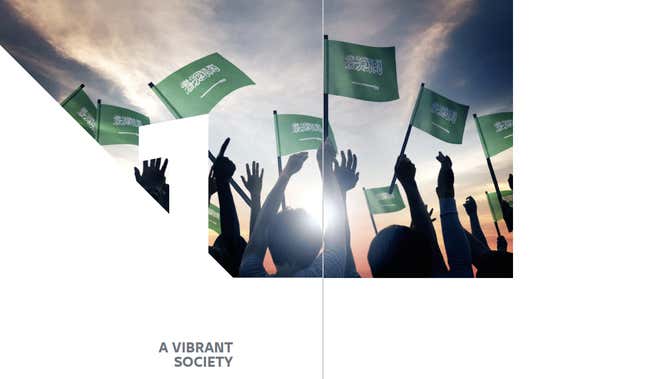
Over the course of a few weeks, I spoke to several LGBT, atheist, and migrant-worker Saudis about the fear involved in day-to-day life. For their protection, those I spoke to picked or asked me to pick fake names for them. The courage they demonstrated in speaking with me, and the openness they showed, speak to how strong they are in the face of hatred taught since birth.
I spoke with atheists who were also legal minors. There was Lisa, a girl in a coastal city far away from Riyadh. From her experience, being farther away from the capital meant less danger, as she found social conservatism to be far stronger in the heart of al Saud’s power.
Like most I talked to, she hadn’t been an atheist for more than a year. When I asked her what spurred her into nonbelief, she warned me, “first answer is ridiculous and gross.”
“I think the number one reason that gave me doubts was... shitting. I just couldn’t believe that allah would do that on purpose. How can you shit one minute and then be praying the next?”
She subsequently showed me something she had been writing about why she no longer believes. Her reasons went far deeper than the scatological. She spoke about the gross abuses of power at the hands of religious police, preachers, and families; the shame that is drilled into Saudi children’s heads; the mutaween who terrorize at will; and the ever-present fear she feels, all of which made a child in one of the world’s most powerful theocracies decide there was no God.
Fear was the common thread among everyone I spoke to. That fear is made worse by the arbitrary way in which the state metes out punishment. A vocal atheist or gay person may get lashes, imprisonment, execution, or a slap on the wrist, depending on how powerful the clan they belong to is, whether they’re connected to the sharia judge or not, and how angry hardliners are at their transgression.
Before the state gets involved, punishment for straying from the narrow path of acceptability is frequently dealt out by families and Saudi society at large.
Families usually make an attempt to bring atheists back to the light of belief by bringing in an imam before resorting to other measures, but it’s more perilous if their sexuality is what offends. “Your family will harm you if you bring shame to them,” Rebecca, an atheist student, told me. “Being LGBT is more shameful and harder to hide.”
Privately-administered punishments for LGBT family members range from essentially imprisoning them in their own homes to exiling them, from corporal punishments to death. In one case I was told of, a girl who was found to be gay was shot by members of her own family. They told the authorities that she died cleaning a gun, an explanation apparently acceptable to everyone.
Young people in Saudi Arabia are not automatons who pray five times a day and wait to get married. They have lives, relationships, and the same dramas that kids anywhere else do. They drink, smoke, and have sex, despite the laws of the land. They usually do so in compound parties, big soirees where clans invite their friends over to their walled-off estates, mostly away from the prying eyes of the public. But if you’re a nonbeliever or LGBT, even this isn’t a safe option. To be caught drinking is one thing, but if the authorities who bust up the party take your phone and see that you’re an atheist or gay, it becomes a whole different set of problems.
For Sarah, an atheist and lesbian minor, the solution is easy: To avoid the ire of Saudi society, she avoids Saudi society. “The pretending is somewhat easy. I just avoid interacting with people when I can.”
This is the story of how Saudi Arabia was deranged by its rulers and their allies.
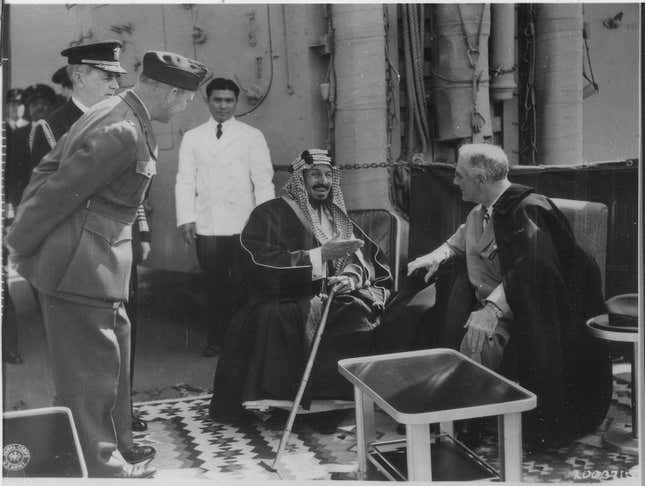
Our two nations have been allies since Franklin Delano Roosevelt met the first Saudi King, Abdulazziz ibn Saud, immediately after the Yalta Conference in 1945. In the years immediately following, the relationship would be more accurately described as exploitation, especially during the reign of King Saud (1953-64). The United States profited immensely off of Saudi Arabia’s oil production through Saudi Aramco, the country’s national oil corporation. Aramco was largely owned and controlled by Western entities. The Sauds owned a pittance of the firm, and would blow through their royalties as quickly as they came in. Then King Saud was deposed by his brother Faisal for, among other things, suspected alcoholism (Saud was the only Saudi king not to serve his term until death).
King Faisal, who reigned from 1964 to 1975, wasn’t a fuckaround playboy like his predecessor or many of his successors. He understood the leverage Saudi Arabia’s oil gave him, and once the state started buying more ownership of Aramco, Saudi Arabia became richer and more powerful than ever before. He became a hero in the Arab world for bringing the West to its knees during the 1973 oil embargo, and as the money flowed in he built skyscrapers, hospitals, TV stations, and, most importantly, schools.
The rapid development upset some members of Saudi Arabia’s religious elite, who thought that the modern world Faisal was bringing to the kingdom would cause the masses to forget the fundamentals of their very strict form of Islam. Faisal made them a deal: Development would continue, but the schools he was building would be staffed by teachers from the most conservative of Egypt’s Muslim Brotherhood. Though the Brotherhood’s interpretation of Salafism differed from that of the Saudis’ Wahhabism, Faisal needed teachers, and this was the only arrangement that would satisfy those who feared popular abandonment of conservative values.
Not even a king can please everyone. One day in late March, 1975, Faisal was conducting majils, an Arab custom where one opens one’s home to guests—in this case, citizens petitioning the king on the types of things constituents might ask their members of Congress. Unfortunately for Faisal, one of those citizens was his nephew Prince Faisal bin Musaid. Prince Faisal’s brother, Prince Khaled, had been killed by a cop during an anti-secularism protest a month prior. When the king rose to embrace his nephew, Prince Faisal shot him through the chin and the ear. The king died that night.
Four years after Prince and King Faisal were put in their unadorned graves, King Faisal’s half brother Khalid was king, and another grand humiliation occurred.
For the two weeks between November 20 and December 4, 1979, Mecca’s Grand Mosque, which surrounds Kaaba (the holiest site in Islam where pilgrims venture to during the Hajj), was seized by an armed group who, not for the first or last time in the history of armed groups in the Gulf, believed they were following the Mahdi (the prophesied “Redeemer” in the Koran who arrives to govern earth for a few short years before the Day of Judgement).
Like many violent would-be religious rulers, this was mostly a group of rich kids. Juhayman al-Otaybi, the ringleader (but not the declared Mahdi—that would be his brother-in-law Mohammad), came from one of the city of Najd’s most powerful families. His grandfather was one of Ibn Saud’s riders, and probably saw T.E. Lawrence commit some act of sexual psychosis.
Juhayman, like so many who have been handed everything in life, believed there was a point where his country had gone down the wrong path—secularism—and that he knew how to make things great again, through some combination of his brother-in-law’s status as the Mahdi and more brutal repression of women.
Juhayman and his hundreds of followers beguiled Saudi forces. Even after scores of their ranks had been killed, the survivors used a system of tunnels underneath the Grand Mosque to hide from Saudi Army and National Guard troops. Flustered, King Khalid called in special forces operators from France’s elite GIGN and Pakistan’s SSG.
There’s some disagreement over who actually went in and got the last holdouts to surrender, as an indiscriminate volley of tear gas and explosive grenades killed several of Juhayman’s hostages, but it was ultimately foreign forces who won back the Grand Mosque for the Saudis.
It was mortifying in every aspect. Saudi monarchs felt they had allowed pilgrims to be killed, and had to resort to foreign troops, some of them not even Muslim, to do their dirty work. The religious hardliners had brought them to their knees, and made them look foolish in front of a world that just six years prior buckled under the strength of their oil embargo. So even while surviving members of the raiding party were swiftly beheaded, those in the kingdom that shared their views (aside from the specific belief that some minor rich kid was the Mahdi) were rewarded. The upper management of the royal family, from King Khalid on down, decided that reifying religious authority and social conservatism was the only way to maintain their grip on power.
This could be read as chickens coming home to roost. In the 18th century, the Saud clan adopted Muhammad al-Wahhab’s fundamentalist strand of Sunni Islam in return for his troops’ loyalty in their conquest of the peninsula. After consolidating their power, the Sauds turned machine guns on their own most fervent holy warriors. In the 20th century, the Sauds gave them a blank check.
Remember the ‘80s? As Americans alternately vacuumed up cocaine and purchased indulgences from huckster televangelists, Saudi Arabia experienced its own money-soaked religious revival, all thanks to al-Saud’s embrace of precisely the sort of people who’d killed their king and took their mosque. If you were a preacher in 1980s Saudi Arabia, there’s nothing you could say that was too out there, so long as you respected management. Rallies were held against the concept of photographs, television, anything, really. Meanwhile, with domestic piety at historic highs, the General Intelligence Directorate, the nation’s chief intelligence body, was burning through hundreds of millions of dollars funding armed groups abroad, buying them weapons and bringing them to the light of Wahhabism.
Prince Turki al-Faisal, the head of the agency at the time, was one of the higher-ups who decided that they needed to feed the hand that bit them in 1979. During his tenure, Turki made insurgents out of Afghans, Pakistanis, Chechens, Dagestanis, and anyone else who could be of some use against a regional enemy. He also discovered that wealthy radical Saudis, the kind who could rally groups of armed men to strike against his family but were too important to be disappeared without charges, could be put to similar use. The most notorious of these types was Osama bin Laden, but there were several others. To this day, there are rich Saudis dicking around in Syria, living out their twisted sense of noblesse oblige by locking Alawite women in cages, beheading children, and occasionally killing soldiers loyal to the Syrian Ba’ath Party, one of Saudi Arabia’s current enemies. For wealthy Saudi families, potential problem sons are best seen abroad starring in hostage videos, not heard at home protesting your opulence, hypocrisy, and inability to follow every single tenet of Muhammad Ibn al-Wahhab.
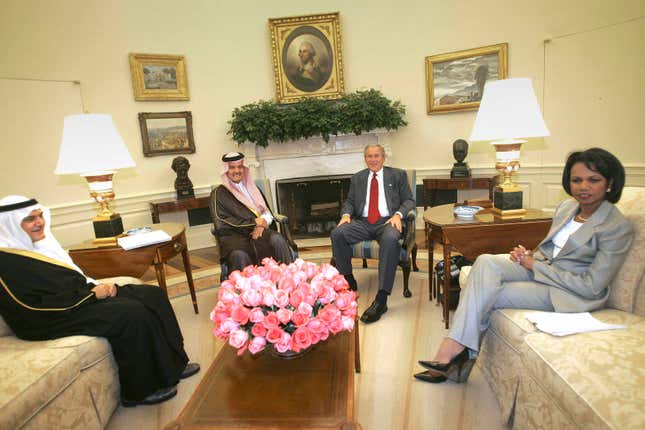
Throughout this, the United States’ bond with the Saudis only grew stronger. In the years following Faisal’s death, America and Saudi Arabia bonded over more than oil: They decided to kill communists together. During the Soviet Union’s occupation of Afghanistan, Saudi intelligence acted as a link between the CIA and Afghan mujahadeen, and the Haqqani network (a Deobandi insurgent group adjacent to and predating the Taliban, but more secretive and run at its heart by the Haqqani clan). As the head of GID, Prince Turki bundled donations from rich Gulf families for armed groups, coordinated operations between the CIA and militants, and procured weapons such as the the FM-92 Stinger, the portable surface-to-air missile that used infrared homing technology to blast Russian helicopters out of the sky and helped turn the tide of the war for anti-Soviet guerrillas.
Even after the last Russian soldier left Afghanistan, the deep states of both nations had many shared goals. We saw in Saudi Arabia an ally in the Arab world who hated Iran as much as we did, who stood for the established order of petrodollars and against the revolutionary zeal of Ruhollah Khomeini, so much so that they’d let us park our troops in their country as a staging area before Operation Desert Storm. To our politicians, they have been equal parts useful ally and generous patron, their pocket change kicking around influence-peddling vanity charities, or buying weapons their troops can barely use in deals that nonetheless make former Congresspeople and staffers rich beyond belief as they enter the “lobbyist” phase of their lives. A gay person getting his head lopped off or the rape of a Southeast Asian maid is a small price to pay for the geopolitical synergy and wealth available to the kind of worms that populate the halls of power.
So the United States political class has sat and watched all these years, having their factotums send out soft press releases on Friday afternoons about “human rights concerns,” knowing full well it’s the bare minimum of due diligence they can do while they line their pockets. Since the Grand Mosque debacle, we’ve seen the Sauds exploit religious extremism for their own ends in every possible way. We’ve seen those Muslim Brotherhood teachers Faisal hired teach an entire generation of parents how pure their faith must be. And those who were children when Jimmy Carter and his team of clods cast their lot with Prince Turki are now the parents who shame, imprison, and kill their children if they’re gay or stop praying.

Rebecca, the atheist student, told me that the quickest way to ensure the Saudi state imprisons, lashes, or kills you is to speak out against the political order. That pervasive fear of speaking up made itself apparent once I finally spoke to a member of probably the single most vulnerable group in the entire nation, migrant workers.
Esther, a migrant worker and student, was quicker than anyone else I spoke with to bring up anonymity: “[...] I could get in trouble if whatever you’re writing reaches an angry khaleeji reader who thinks I don’t have the legal right to even criticize the govt. And I don’t.”
She continued: “Any form of dissidence especially from migrants (it doesn’t matter that we are born and raised in the gulf or have been living there for decades, we don’t receive citizenship, especially not if we’re non Muslims on top of being non Saudis, Kuwaitis, Emiratis and so on) is met with jail time, execution, deportation.”
Esther directed me to a page on a social network meant for users to ask anonymous questions. Among the usual questions young people ask each other were scores of threats from angry Saudis threatening her, telling her that they’ll figure out who she is by her avi, that they’ll get her entire family deported.
This was different than what I saw with other people dealing with. The threats they got were hateful, but these people talked to Esther like she wasn’t even human. It was as if they were complaining about an appliance that suddenly stopped working. To the many Saudis, migrant workers are objects who perform tasks.
The institutions of the state and enterprise see them that way, too. Human rights abuses are rampant, maids from Southeast Asia are routinely raped with scant prosecution of their attackers, and anyone who speaks of their mistreatment is jailed or worse.
Migrant workers face the absolute worst Saudi Arabia has to offer. The nation runs on their mistreatment, as they compose nearly one third of the nation. While middle class Saudis benefit from cushy ministry positions or make-work National Guard posts, the worst and most dangerous work is taken up by imported labor with legal protections scarce enough to make the average Saudi look empowered.
If you’re the wrong type of person in Saudi Arabia, an unlucky glance at your media grid could get you flogged in front of everyone you know. You can lie to everyone you come in contact with until your heart finally stops beating, or, if you’re one of the luckiest few, you make it out and seek asylum in another country—even then, you’re not completely safe.
Life for the ruling class is different.
Saudi Arabia’s royal family has around 15,000 members—plural marriage and virtually unlimited resources make for a pretty large family. As in any family, power is stratified; not everyone gets to be from the powerful Salman branch, or one of King Faisal’s capable sons. And as in every family, you get a lot of failsons.
Your average failson, though, doesn’t have access to wealth that could be in the hundreds of billions of dollars. Mix together low expectations, zero consequences, and more money than God, and you get some notable results. Sometimes they ineptly try to smuggle two tons of uppers on their private jets. Other times, they’re pure fucking evil. But if you’re one of these lucky thousands, your countrymen will probably never place a pair of handcuffs on you, or even ask you to come down and answer a few questions. When you’re anointed by God, even your shittiest offspring get some hall passes.
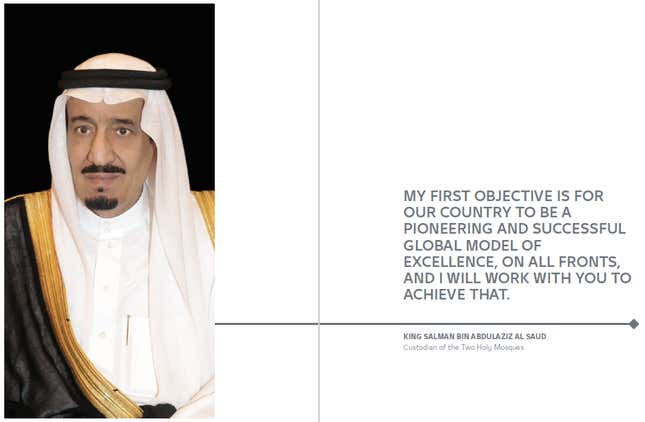
How do you get a citizenry to tolerate this sort of injustice? Or a near-constant fear of being shamed and killed, or having to hide most of the things that make them human? One way is simply to pay them off. By spending to keep Saudi citizens out of the pig shit, the ruling family accomplishes two things: For one, they keep them from complaining too much. Secondly, they keep people nice and isolated. By preventing Saudi citizens from working truly horrible jobs with each other, it cuts down on the chances that people go outside their social group, clans, and classes.
Isolation is something everyone I talked with seemed to have in common. When I asked if there were groups for people of different sexualities or atheists, they had maybe heard someone talk about it, but it was unverifiable. No one they knew was in one. They hadn’t talked to too many people like themselves, even with social networks. Migrant workers talk to each other, but if they talk too loud, they get locked away, and no one will lift a finger for them. Most regular Saudis have never experienced a civil society that transcends familial, clan, and class bonds.
I doubt Mohammad bin Salman really wants to change Saudi society all that much, after decades of deliberate effort by his own family to make it as hard to change as possible. I also don’t think the paid ass-kissers and tech masters of the universe truly have any idea how apps could fix a national system designed to treat the majority of a nation’s residents as second-class citizens at best, and defective property at worst. Even if they did have benevolent intentions beyond enriching themselves, the systems and technologies they’re so excited about are already tools for the same hateful takfiris they pretend they’re upending. It’ll take more than a car service app to fix a country that was deliberately driven insane.
But after all this, and despite how hopeless it sounds, I can’t end on a nihilist note. The people who spoke with me were courageous and generous. They opened their hearts and lives up to me. On their feeds, they speak with justified anger not just about their own situations, but also about the plights of black Americans, Palestinians, and every other group in the world that’s gotten the shit end of the stick. I saw enough real courage and compassion in them to believe, one day, that they can make Saudi Arabia less awful for its most exploited and marginalized.
When it comes to forcing social progress, young people who unabashedly want the world to be a better place have a much better track record than apps. They’re just less likely to make lanyard-wearers rich in the process.
